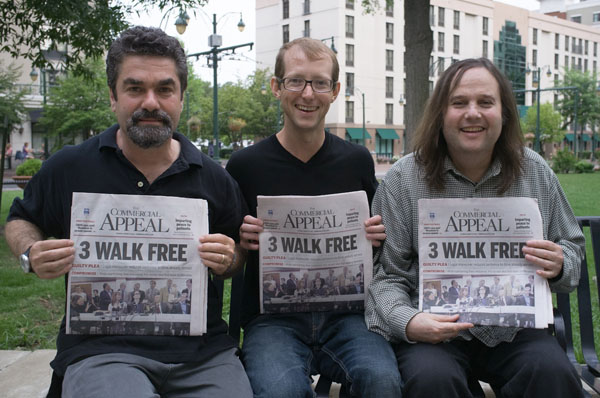
Director Joe Berlinger, left, Jason Baldwin, and director Bruce Sinofsky (Photo: The Film Society of Lincoln Center)
Directed by Joe Berlinger and Bruce Sinofsky
Produced by Berlinger
Released by HBO Documentary Films
USA. 121 min. Not rated
For over 18 years, directors Joe Berlinger and Bruce Sinofsky inspired diligent and dedicated support to get three teenagers convicted of the horrible 1993 murders of three eight-year-old boys in West Memphis, Arkansas, out of jail, including one on death row.
This third film in a trilogy brings a new viewer up-to-date, while reinterpreting the original material from the previous films and incorporating old outtakes and photographs that were not used in the first two parts. Paradise Lost: The Child Murders at Robin Hood Hills (1996) spurred sympathy for the accused—Jason Baldwin (arrested at age 16), Damien Echols (then 18), and Jessie Misskelley Jr. (then 17, but of lesser mental age), whose confused police confession led to their arrests. (Newspaper reporting of it tainted the jury pool towards conviction). Warning: in reviewing the original crime, there are explicit images of the victims as they were found. The brutality of the murders helps to explain the community’s horrified reaction. The first documentary inspired the founding of the Free the West Memphis Three Support Fund, which collected donations for a new legal team.
The stymied legal process reported in Paradise Lost 2: Revelations (2000), with the original judge rejecting all appeals, spurred more celebrity (Eddie Vedder and Johnny Depp among them) and online support to raise funds for a more comprehensive forensic analysis. These experts’ factually damning presentation in 2007 against the authorities’ lack of investigation of the physical evidence is a core of the newest film, and their findings helped convince the Arkansas Supreme Court to order a new hearing. The footage of the judges’ questioning of the state’s attorney general in the groundbreaking case moves the use of DNA to Law & Order legal context from CSI science. The filmmakers intended for part three to influence that hearing, originally set for later this year, by scheduling the HBO showing for this fall. They are sure that date pushed the local authorities to make a deal that resulted in the legally convoluted release of the prisoners, rather than face a negative decision from a new judge or a civil suit.
It is still uncomfortable to see how the filmmakers deal with the Southern good ole boy John Mark Byers, a bombastic stepfather of one of the victims. Just as in Part 2, they cast heavy aspersions on him. They open by doing that to another victim’s father, and then awkwardly pull back, saying they don’t want to commit the same fallacy in desperately suggesting other suspects. They now seem to use him as a replacement for voice-over narration. (There’s a disclaimer in the credits about honoraria paid to participants without identifying the recipients.) Year by year, they kept interviewing the prisoners as they steadfastly insisted on their innocence and reported their prison coping mechanisms. For Echols, that included his dedicated and determinedly optimistic wife, who fell in love with him based on the earlier films, even as marrying a death row inmate seems, at the very least, questionable.
The mania about supposed Satanic cults conducting weird rituals that helped to bring this case international attention—shown thoroughly in the first part—is here communicated through a barrage of excerpts from the local media that fanned the hysteria (now hypocritically doing an about face in current clips), and in new revelations. Towards the end of the film, the “expert” on satanic cults, who authoritatively testified at the first trial, proudly pulls out files from a year before the murders to show that the local police asked him to evaluate samples of Echols’s drawings as examples of a local threat. There are also eyewitnesses to the biased jury foreman’s eagerness to serve and how he brought evidence into the deliberations that was excluded even by the prosecution-favoring judge. Indirectly, the Metallica songs on the soundtrack again, as in the other films, counter the notion that the three young men’s dedication to heavy metal music was proof of their devil worship.
Paradise Lost 3 is somewhat confusingly organized, perhaps due to hasty, and very appreciative, re-editing after the sudden release of the three prisoners on August 19. The now adult and mature West Memphis Three made their first public appearance at the New York Film Festival’s premiere screening. HBO, which commissioned each film, will air the film in January 2012.
















Leave A Comment